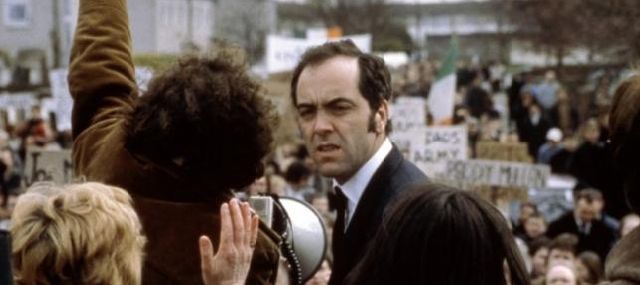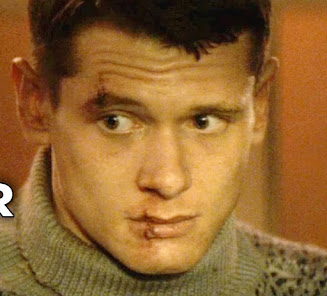My Favorite Films, Plague Edition (Volume 20): Films about The Northern Ireland Troubles
Bloody Sunday (2002)
Directed by Paul Greenglass
’71 (2014)
Directed by Yann Demange, starring Jack O’Connell
The Northern Irish “troubles” of the 1970-80s, once seemed to rival the middle east when it came to intractable conflicts. The ceaseless bloodshed between Catholics, Protestants, and the British “peacekeepers” was a steady news item of my youth. Given the Irish propensity to fine drama and stark tragedy in literature, it is not surprising that good films would emerge telling the chronicle of that sad era. Bloody Sunday was an early film of Paul Greenglass (b. 1955), an English director who would go on to make compelling docu-drama films like United 93 (still the best 9/11 movie) and Captain Phillips, the Tom Hanks drama about a tanker hijacked by Somali pirates. Bloody Sunday tells the story of the infamous massacre in Derry in 1971 where overeager and jittery British troops shot 26 civilians, killing 13, on a day that was intended for a peaceful protest march by locals. The event is famous for the later British coverup, and for its precipitation of 30 years of warfare between the IRA and the Protestants--an example of how heavy-handed policing can cause trouble, rather than solving it (where have we heard that before?). This film, made just after the Northern Ireland peace accords were signed, shows all the stylistic elements of Greenglass’ later films: jittery hand held cameras, frantic pacing, a sense of non-manufactured reality as if you are placed right in the action and the chaos. The only plotted “drama” that draws us into the characters in a conventional way is the portrayal of a young man who is eventually killed, and of Ivan Cooper (James Nesbitt) the member of Parliament who tries to keep things calm, to no avail. Somewhat like United 93, Greenglass manages to take no sides between the Protestants and Catholics, although he is very critical of the British troops’ aggression and ineptitude. Greenglass is adept at portraying the randomness and chaos of riots and crowd reactions/emotions, and succeeds by never letting us quite know who is being shot, who is OK, and who is doing the shooting, until it’s all over, much as real chaos occurs—knowing what happened later does not mean there is any certainty at the time. While the troops are criticized, Greenglass’ style makes us see how tense, frightened, or prejudiced young soldiers can make very bad, and horrible decisions, given the stressful environment they have chosen to work in. Its perhaps ironic that our youngest, most emotionally undeveloped adults are placed in such situations where the greatest judgement is required. That’s war.
Twelve years later another talented director, newcomer Yann Demange (b. 1977) revisits similar ground in his debut film ‘71, this time in a fictional portrayal of a young British solder Gary Hook (the outstanding Jack O’Connell, below) who, on a foray of British troops into Belfast, gets caught up in a riot and left behind, as his fellow troops retreat. The entire film takes place in the eight hours in which he journeys through hostile Belfast as he tries to get back to his barracks. As he does so, he meets all the characters of that tragic period, in the classic tradition of the Iliad. This includes Catholic families trying to stay safe amidst the carnage, Protestant and Catholic youth who have lost all sense of decency and compromise, and all manner of troops, ranging from the young, innocent, and clueless (the protagonist) to the duplicitous and sociopathic. Director Demange clearly borrows some of Greenglass’ techniques from Blood Sunday—handheld cameras, tracking shots of the young solder fleeing for his life, edgy quick cuts to build tension. He clearly has all the directing skills to pace and hold our attention (and tension) while, like Greenglass, not really taking sides. But, unlike Greenglass, he does not just direct masses of people and compelling action shots, but also convincing characters with whom we sympathize. So this is the more complex, better film of the two.
The protagonist Gary Hook is similar to other innocent young soldiers placed into confused warfare, ranging from Henry Fleming in Crane’s The Red Badge of Courage to Paul Bäumer in All Quiet on the Western Front to Solomon Perel in Europa Europa. In the film versions of these, all the directors favor baby-faced actors to provide the maximum contrast to the surrounding brutality (see above and below). Jack O’Connell fits right into this tradition. He is in every scene, tracked and filmed close-up, every twitch and grimace amplified. In what is really a very conventional plot (will our hero get home?) somehow the director and actor conspire to create maximal nuance and tension. We cringe when he has to kill to survive, just as he cringes in doing so. We really pull for him, even as he represents an armed force that is evil. More than in any film I have seen, this one captures how vulnerable young people, perhaps with initial patriotic ideals (or simply a need for employment) become compromised and dragged into the pit when they join the military. The talent of this young director is how he can enliven some pretty familiar material, such as the subplot of the young soldier’s bond with his little brother, confined to a youth home in the absence of parents. This could have just been a maudlin contrast to the Belfast violence, but was instead a touching prelude and postlude to the main action. This is a director to watch, as he can put together all the elements of a varied, compelling film that makes you reflect afterwards. I look forward to seeing more of his work.




Comments
Post a Comment